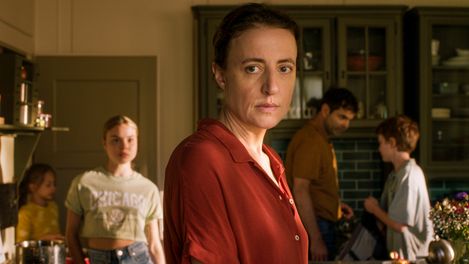Eye For Film >> Movies >> The Sparrow In The Chimney (2024) Film Review
The Sparrow In The Chimney
Reviewed by: Sergiu Inizian

Ramon Zürcher's latest directorial effort probes the troubled subconscious of an extended family as they turbulently clash at a tense party in the idyllic countryside. His third entry into what is now loosely called the "animal trilogy" takes a symbolic approach to the story, elaborate allegory and mistimed theatrics taking a toll on the viewer's rapport with the characters. Despite having a cast of impressive intensity and gracefully capturing nature's radiance, The Sparrow In The Chimney displays a stiff sensibility that flattens its ambitious exploration of familial turmoil.
Karen (Maren Eggert) lives with her husband Markus (Andreas Döhler) and their kids at her childhood home, an isolated countryside residence surrounded by bright and bustling nature. When her sister Jule (Britta Hammelstein) and her family arrive for Markus’ birthday party, memories of the house resurface, and Karen’s grappling with her traumatic past becomes apparent. As they prepare for the celebration, the other characters complete the picture of a distressed family, most of them sharing a jarring antipathy towards Karen. Johanna (Lea Zoe Voss), her teenage daughter, who is resentful of her mother, rebels against her and her rigid personality at every step. While less contradictory, the mother's relationship with Leon (Ilja Bultmann), her only son, often boils over, further isolating her from the children.

Employing a static camera that shows each character as separated portraits from the others, Zürcher creates a feeling of divergent inner worlds. Still grieving for her late mother, despite her cruelty, Karen's headspace is the most evident and has a haunting effect on the others. Remembering their tyrannical parent and trading biting words, the two sisters set the scene for a string of abrupt interactions that come across as dull, being overshadowed by an excessive sense of rancour. Unable to mirror the joy of her sister's familial life, Karen, played stoically, if not tragically motionless by Eggert, plunges into a pit of despair and obsessive control.
As Zürcher explores his protagonist's psyche, straining the limits of a pervasive sense of turbulence, he steers the narrative into a dream-like realm of refreshing sincerity. Surrounded by kaleidoscopic lights and thrilling synth sounds, Karen allows her nostalgic yet dejected personality to dissipate, creating a genuine sense of hypnotic transformation. This moment prompts the Swiss director to bring her story closer to Liv (Luise Heyer), a mysterious woman who has an affair with Markus, a husband and father defined by impassivity. Despite this distressing situation, the two women share meaningful glances, pining for each other's life and sharing mutual empathy for their loneliness.
Liv gets to experience the life of a mother when she looks after Karen and Jule's children, as the sisters and their husbands head out to a restaurant. A moment of genuine warmth, the children's gathering feels like a brief counterbalance to a narrative occasionally defined by flat dialogue and a sense of sluggish scornfulness. Christina (Paula Schindler), Karen's third child, returns home after some time away and shows up as the honest and empathetic sister Johanna needs. Leon, on the other hand, can forget about his neighbourhood bullies and focus on his passion for cooking. Capturing the delicacy of nature and the enchanting allure of fireflies, Zürcher and cinematographer Alex Hasskerl create a tender atmosphere around their young characters, fleetingly removing the painful memories that lie under the roof of an emotionally overbearing house.
The Sparrow In The Chimney surrounds its characters with striking imagery, painting their struggles through flourishing greenery, vibrant lights and an unexpected rave scene that passionately expresses Karen's entrenched pain. While this attentive visual exploration of familial degradation feels earnest, the interplay between the ensemble cast lacks a unifying element, resulting in a provocative but ultimately sprawling narrative. Karen's trauma might be the key to unlocking Zürcher's latest work but there's an awkwardness to how the other characters interact with it, causing the breakdown of central relationships and their delicate undertones before they can fully engage the viewer.
Reviewed on: 11 Aug 2024
















